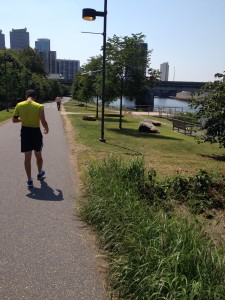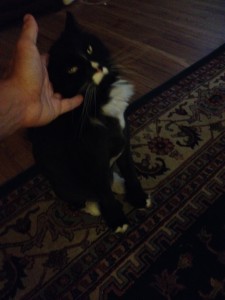
 Coming out of the airplane at the Philadelphia airport, I feel sad. Philadelphia is not a happy place for me, despite all the good things that have happened, all the opportunities it affords me, the friends that live here.
Coming out of the airplane at the Philadelphia airport, I feel sad. Philadelphia is not a happy place for me, despite all the good things that have happened, all the opportunities it affords me, the friends that live here.
I debate between taking Uber all the way to where I’ll be staying, vs. taking a train to 30th St Station and walking the rest of the way. It’s hot outside, or so I hear – through the airport windows, all I see is a bright day, and I wouldn’t know where to find fresh air if I wanted to. But Uber seems a little expensive at $45, and I decide to take a train into town and then take Uber.
I notice I have voice mail. My friend Eran called, and is available to talk for the coming hour. We have been trying to catch one another for a few weeks now, since he has been moving with his family from Tel Aviv to the north of Israel. I realize, once again, that my time is my own, and I don’t need to rush. Instead of getting on the train and trying to speak across the ocean with all the noise around me, I find a comfortable seat at the airport and call him back. We talk, and he sounds good, happy about the move, pleased with living out in nature. He is even pleased about the long commute to Tel Aviv, since it will give him more time to talk with friends on the phone, including me. I am pleased about that, too. After we talk for a while, he says he is getting close to home, so we will have to finish soon – the village voted not to have any cell towers in the area, so there is no cell reception there.
We hang up. I get on the train, and a few minutes later it starts moving. People shuffle in. A little old lady struggles with her little old suitcase, and a huge overweight man helps her with it. I smile at him as he passes, huffing and puffing – maybe from the effort of lifting her little suitcase, but more likely from the effort of moving himself. The conductor tries to explain something to a man sitting two seats in front of me, who seems to speak mostly Thai. The man offers the conductor his cell phone, presumably to speak with someone who can translate, but the conductor says he isn’t allowed to speak on cell phones. Another man, who realizes he’s going to the same place as the Thai man, takes responsibility: “Just follow me,” he says, and the Thai man smiles and nods. Whether or not he understood is irrelevant – when it was time to get off the train and switch to another one, the volunteer guide pulls the Thai man with him. People are helpful here, on the train from the airport to the City of Brotherly Love.
I arrive at 30th St station, climb down the escalator. I decide to walk towards Liesa’s house, where I will be staying, trolley and all. I’m not sure how long it’ll take, but if I get tired, I reason with myself, I can always summon Uber.
 I set out walking, cross the huge doors out and into the street. The heat slams into me, but there is no need for my hat, which I put on even before leaving the train station – the sky is overcast. On the bridge across the Schuykill river I take the stairs down to the Schuykill Banks park, which will take me to the Art Museum, which should be pretty close to the house. People are jogging past me, zipping on their bikes, walking their dogs. I trudge on with my trolley, looking at the people, at the dogs, at the water, at the traffic on the other side of the Schuykill, at the huge buildings. As I cross under a bridge, one half of a pair walking towards me says “Eran!” and it’s Lee, who was my house mate during the months I lived in a shared home before getting the hell out of Philadelphia. Lee! He’s a singer, and very Christian, and a thoroughly good guy. I hug him, and next to him is Hillary, who is now his Fiance. I congratulate them, and ask without thinking: Would you like to sit down and sing for a bit? I have my little hiking guitar with me, and he says Sure and Hillary seems into it, so we occupy a patch of grass and a warm rock and sing some songs and talk for a bit. It’s his birthday on Sunday, and we make a tentative plan to meet again.
I set out walking, cross the huge doors out and into the street. The heat slams into me, but there is no need for my hat, which I put on even before leaving the train station – the sky is overcast. On the bridge across the Schuykill river I take the stairs down to the Schuykill Banks park, which will take me to the Art Museum, which should be pretty close to the house. People are jogging past me, zipping on their bikes, walking their dogs. I trudge on with my trolley, looking at the people, at the dogs, at the water, at the traffic on the other side of the Schuykill, at the huge buildings. As I cross under a bridge, one half of a pair walking towards me says “Eran!” and it’s Lee, who was my house mate during the months I lived in a shared home before getting the hell out of Philadelphia. Lee! He’s a singer, and very Christian, and a thoroughly good guy. I hug him, and next to him is Hillary, who is now his Fiance. I congratulate them, and ask without thinking: Would you like to sit down and sing for a bit? I have my little hiking guitar with me, and he says Sure and Hillary seems into it, so we occupy a patch of grass and a warm rock and sing some songs and talk for a bit. It’s his birthday on Sunday, and we make a tentative plan to meet again.
And I think: How perfect. To meet friends in the middle of the city, to sit down and sing for a bit, to recharge in this way with friends and music and connection, and then move on.
 I arrive at Liesa’s house, her neighbor gives me the key, I get in and meet the cats: John Wayne, Margaret (who is really a boy), and Tonto (who is orange). John Wayne and Margaret make friends with me right away; Tonto seems scared of me, and I don’t see him until the second day. They are nice cats, good cats, and I am sad to see them; my cat lives 30 minute away, and so does my beautiful little dog, who I taught to jump through a hoop made of my arms and who loved standing on me when I was driving him to the park. I will probably never see them again; I may get an Email to let me know when they have died. I am comforted to know that it is I who miss them, and probably not the other way around. Animals love who they see, but I doubt they think of those they don’t. Comforted, but still sad.
I arrive at Liesa’s house, her neighbor gives me the key, I get in and meet the cats: John Wayne, Margaret (who is really a boy), and Tonto (who is orange). John Wayne and Margaret make friends with me right away; Tonto seems scared of me, and I don’t see him until the second day. They are nice cats, good cats, and I am sad to see them; my cat lives 30 minute away, and so does my beautiful little dog, who I taught to jump through a hoop made of my arms and who loved standing on me when I was driving him to the park. I will probably never see them again; I may get an Email to let me know when they have died. I am comforted to know that it is I who miss them, and probably not the other way around. Animals love who they see, but I doubt they think of those they don’t. Comforted, but still sad.
I explore the house a bit, discover that there is no bathroom on the first floor, that my guest bedroom is on the second floor, that the house is filled with a huge amount of stuff. Liesa has a sign above her kitchen sink that makes me laugh out loud: “God, grant me patience. But hurry.” It takes me a while to realize what feels strange: I don’t see any books. Next to the large flat-screen TV in the living room is a closed cabinet. I open it and discover a row of books. I prop both doors open, to let some bookness seep into the room, and keep the cabinet open from that point on.
I am hungry, and after putting my stuff away I decide to go eat some bad-for-me vegetarian Chinese food at a restaurant I used to go to occasionally in Chinatown. It’s farther than I realize, and on the way there I remember that Philadelphia does not feel safe, after crossing through lonely streets where the only other people I see are sitting on the sidewalk, leaning against walls of empty parking garages, staring into the air or dozing off. By the time I arrive at the restaurant it’s already dark, and the restaurant turns out to be closed on Mondays. I hesitate – shall I go buy groceries and head home, or try another restaurant? I decide to go for the other restaurant, one that I have only gone to once and did not enjoy very much. I find it, it is open, I go inside. I am seated and I order a huge amount of food. The server is very nice to me, and the food is decidedly mediocre, despite the fact that I am very hungry. In the table in front of me two young guys are eating and talking. I consider inviting myself to join them (a longtime fantasy of mine, meeting people at restaurants or cafes) and then decide not to. They talk about NYC, about missing it, about people they used to date and now have bad relationships with, about how they hate Philadelphia and feel lonely here. For me, too, Philadelphia never worked out socially. While I was living here, I felt like I never managed to grow strong, close friendships. I could never tell why.
I stuff myself silly, finishing every last bland and oily scrap. As I’m about to finish, an older couple sits down at a nearby table. The man asks the woman if she would like an appetizer. I think he wants an appetizer. I get up to leave, and realize I have eaten so much I am almost at risk of throwing up. I waddle to the front, pay, and waddle out. I am glad I have a long walk back to help me digest the food, but I’m concerned that I might (a) throw up, and/or (b) get mugged.
I keep my eyes open as I walk, stay aware of what’s and who’s around me. The night is warm and pleasant, the streets are dark and menacing. Two feet stick out from behind a wall. As I approach and pass, the feet connect to legs, a body, an arm flung over a face. I hope he is just sleeping. A few blocks later I think someone is following me, and look behind me as casually as I can. Someone is walking behind me, but seems like a tired guy coming back from work with a toolbox or a briefcase, shuffling on. I feel relieved to get to a roadwork crew, bright lights and men in hard hats and a police car. I keep moving, and my shuffler is still behind me. He stays behind me for many blocks, even as I cross the street and turn new streets. As my paranoia mounts, I eventually I decide to make an improbable move, to force him to walk on or get serious about approaching me. I cross the street back to the side I crossed from at the start of the block. He walks on past me. A few minutes later I find myself walking behind a young man and woman who are walking side by side. I don’t want to creep up on them, so I intentionally flap my sandals as I walk, to let them hear I’m coming. They don’t seem to notice. I flap harder and the man looks back and seems alarmed to see me there, then relaxes. I walk past them.
Grocery shopping at Whole Foods, two blocks away from Liesa’s house. The unsafe world is safely outside, and I have only high prices and over-shopping to fear – but I am still so stuffed that there is little risk of overestimating my need for food. Cereal and frozen berries and soymilk and bananas (breakfasts), frozen veggies and nutritional yeast (dinners), frozen mango (dessert). They are out of vegan marshmallows, to my disappointment – I wanted to bring some to my workshop tomorrow, as a treat for the participants. But we will all survive. At the cash register, the clerk asks me if I have a rewards card. Whole Foods has a rewards card? I ask. Will it also work in California? He shakes his head. No, it’s a new thing they’re testing out just in Philadelphia and New Jersey. This is the Whole Foods innovation zone, apparently. So no points for me today. I move on. The cats greet me at home, and I put my groceries into the fridge. I shower and get into bed. Sleeping in a bed is a clear mark of not being home, a comfortable reminder that I am not in my own space. At home, I sleep on the floor, in my sleeping bag or between two blankets.
In the morning, I walk to Penn, to do my workshop at the med school. I’m wearing my big-boy clothes: Nice pants and a belt and a button-down shirt, walking in my sneakers but with dress shoes in my backpack. It’s warm, but tolerable. It’s also very humid, and my shirt is soaked with sweat by the time I get there. The workshop goes well. People are nice. We talk about how training in the medical world can be done using positive reinforcement techniques, about why it’s good for everyone, practice specific techniques. They are skeptical but receptive, and we turn a corner when I do a demonstration: Teaching a doctor how to juggle three bags of chips using only positive reinforcement. As I teach, I explain what I’m doing, why I’m saying what I’m saying when I’m saying it, what I’m ignoring on purpose, how long I wait before I add complexity to the task. The doctors talk about their own discomfort in giving feedback to trainees; we discover that this comes out of their discomfort with telling trainees that they are failures, because of their own belief that if you’re not perfect, you’re a failure. I make a reference to Talladega Nights’ Ricky Bobby, who learned from his pa that “If you ain’t first, you’re last!” A few of them get the reference and chuckle.
After the workshop, I park myself at a nearby Starbucks – I have a dinner date with a friend at 7pm, and a few hours until then. At 5, Soumya, a friend from the Penn counseling center where I used to work, texts me. Am I in town already? Yes, and actually I’m right by Penn. Well then, she texts back, I’ll come right over. She does, and we spend a couple of hours together before it’s time for me to head off. We talk of important things, things that make us sad and things that make us happy, our hopes and our fears, our joys and our failings. We agree to meet again tomorrow evening.
And I think: How perfect. To meet a friend on the spur of the moment, to sit down and talk for a bit, to recharge in this way, and then move on.
When I lived in Philadelphia, this never happened. Friends were never spontaneously available. Soumya and I weren’t really friends, not until it was clear I am leaving, even though I think we both wanted to be friends since soon after we met. Lee and I never hung out. Now when I come back to visit this city that makes me sad, I find a community here, of sorts. I meet a friend on the street and we stop to sing together. A friend texts me and is nearby so we meet and spend time together.
When I was living in Israel, I had a friend who lived a couple of buildings down the street. She would actually show up in her pajamas and we would have ice cream together. For a few happy months, I had a right-now friend of the kind I always wanted. Then my family moved again, to another apartment too far away to walk to in pajamas.
When I visit in Israel nowadays, I still need to make plans to see most friends, but the plans are very easy to make. People are generally available, or make themselves available – perhaps because of the novelty of having me there. Maybe it’s the same in Philadelphia. When I am visiting, I am a rare occurrence, so it makes sense to clear time for me. If I were here all the time, perhaps it would not have made as much sense to make special allowances. I seem unable to follow this line of reasoning. The people in my life are such a high priority for me, that I often feel like I need to make special allowances for everything else (work, or various quotidian chores). Relationships take precedence.
Where I live now, in the Bay Area, I do not have right-now friends. It usually takes planning, careful coordination, patience (but hurry). There are exceptions. A couple of weeks ago I called Alex, a new friend from improv, to ask if he wants to have dinner – he said yes, and we did (it was tasty). The night before flying here, I walked across the hall to invite my good friends Paul and Mami to dinner. We went, and it was wonderful. We stayed out longer than we planned, walking around the little downtown area of San Mateo, discovering a new boba tea place, watching people and talking about everything. When I go visit friends, I often stay much longer than we expect. It’s fun, and I am blessed with a very flexible schedule, so I sleep over or stay to babysit (read: hang out with the kids) so the grownups can go do grownup things, or whatever. It seems like the hardest part is to actually bridge the gap, break down the wall; once that is done, the togetherness evolves naturally, building its own momentum.
I don’t know why right-now friends are so important to me. I’m not sure what it is about wanting to be able to reach out and find a good, close friend at any moment. I know that I have good friends who will be available for me in an emergency – the night I found out about Lori’s affair, I called friends in Israel, and we talked for hours. They put everything aside for me. I was, and still am, grateful. These days, my need is not as dramatic (thankfully), but still I wish it were easier. The heart, like a child, does not understand the concept of “later.”
